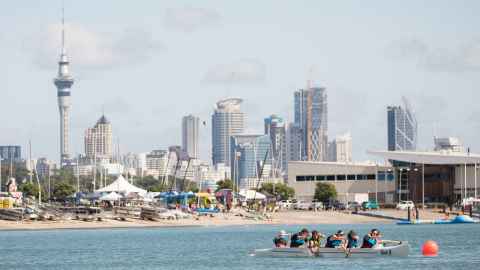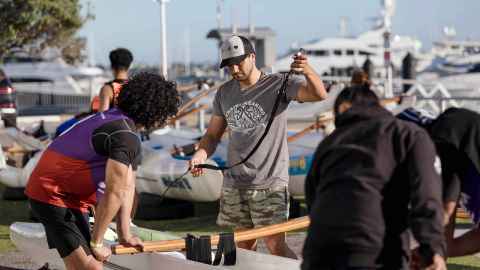Riding the waves of waka ama success
3 April 2024
Waka ama racing has provided a pathway for engineer Nona Taute to deepen his connection with family, culture and the natural world.

Waka ama racing isn’t just a sport for Nona Taute; it’s a cherished family affair that has been part of his life for more than 25 years.
Raised in Rotorua, Nona (Te Arawa, Tainui) first got involved with the sport at the age of five when his school, Te Kura Kaupapa Maori o Ruamata, established a waka ama club. Alongside his father and older brother, who are both racing enthusiasts, Nona has paddled countless kilometres, sharing victories and forging bonds on the water.
His passion for the sport has led to both personal success and a coaching role for teams from the Faculty of Arts and Auckland Law School that took part in The Great Waka Ama Race on 16 March.
The annual event sees faculty and student-association teams race against each other at Okahu Bay for a chance to win the ultimate prize: a trip to Hawaii in late August to represent the University at the prestigious Queen Lili’uokalani Canoe Race, a 30-kilometre six-person competition that’s the largest outrigger canoe race in the world.
This year, Engineering Eagles from the Faculty of Engineering took home first-place honours. Arts Alligators, one of the teams Nona coaches, came a close second. Ngā Tauira Māori placed third.
As well as the technical aspects of paddling, tikanga and te ao Māori are fundamental elements of the team training, which also includes the history of the sport and activities that build a connection to the moana.
Nona is no stranger to championship racing, having won gold multiple times at both the Queen Lili’uokalani Canoe Race with several University teams and the ICF Canoe Sprint World Championships with the NZ Elite team.
He will step in as coach for the Engineering Eagles when they head to Hawaii in August, as his cousin Georgia Naera, who coached the team to victory, is expecting a baby. He’ll also be racing in the Sprint World Championships that take place a week prior.
“I love coaching and competing. The sport is a way of life. As much as it is a competitive sport, it’s also a way to connect to Tangaroa (God of the sea). I always feel like it’s quite healing for me.”

Yet, there is much more to his story beyond the water’s edge. Nona is a lecturer in Civil and Environmental Engineering and is on the verge of finishing his PhD in geothermal engineering.
“I’m pretty big into protecting the environment,” he says.
His work tackles the complex intersection of incorporating Indigenous knowledge into decision-making processes.
“Not only do Māori concepts, values and principles misalign with those of engineers, but there’s a lot of mistrust between Māori and developers, as well as an inherent misalignment of ways of thinking that makes it super hard to integrate the two knowledge systems.
“Māori values are intangible; they have to do with history or spiritual beliefs or sacred sites. In engineering, we have little knowledge on how to practically implement those kinds of values.”
Nona didn’t expect his studies to lead him on a path to academia but says teaching has many benefits, including the chance to enjoy more quality time with his one-year-old son.
“I slowly started seeing all the different pathways and all the benefits of it. After a couple of years doing my PhD, I got asked to teach and started teaching full time. It’s the perfect job if you’re a parent because the hours are super flexible. I get to spend a lot of time with my son.”
Given Nona’s deep connection to waka ama racing and his appreciation for family time, does he envision involving his son in his family’s waka ama tradition?
He smiles. “Oh, of course.”
Hussein Moses
This story first appeared in the April 2024 edition of UniNews.